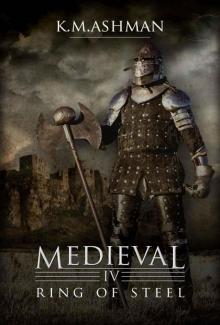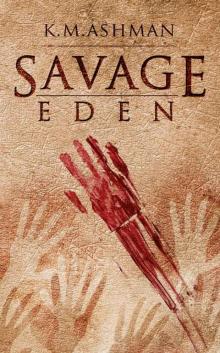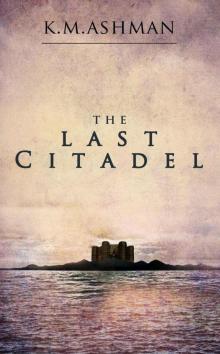- Home
- Kevin Ashman
The Last Citadel Page 2
The Last Citadel Read online
Page 2
‘And I’m telling you…’ shouted Razor, but before he could finish his sentence, an authoritive voice echoed around the chamber.
‘Enough!’ roared Helzac. ‘You are behaving like commoners. Not one of us can afford a new Tower-war, so it falls on us all to control our own trades. It is a joint responsibility and I expect everyone here to take the necessary steps to control their own people. Now can we all be seated and discuss the next item on the agenda?’ He looked around the council, his gaze daring anyone to contradict him. Helzac was getting old, but despite his age, he still had the stature of a young man and could still hold his own in conflict with anyone.
Razor decided against further argument and sat back down in his seat.
‘Ok,’ said Helzac. ‘If there is nothing else, we can continue.’
He turned to the only person in the room not seated at the table. The clerk jerked slightly, realizing they were looking at him and stood up quickly, referring to the seaweed papyrus that was his record.
‘Um, your Excellencies, the next thing on the agenda is the representation of Pelosus.’
The heads of the towers looked at each other in surprise.
‘We weren’t aware of this,’ said Kelly. ‘It was not on the circulated agenda.’
‘It was a late representation,’ said Helzac. ‘He insists it won’t wait, so we will humour him.’
The clerk opened the door and whispered to one of the ever present guards outside. A few minutes later, the shuffling figure of Pelosus entered the chamber carrying a bundle of scrolls, dropping some in his haste to enter the council’s presence.
‘Approach!’ ordered Helzac.
Pelosus walked up to the table and looked nervously around the council, his gaze pausing briefly on the distinguished features of Petra from the Pleasure-tower, recalling his own memories from many years ago on his only visit to her domain. She had been a simple Courtesan then and though she probably had no recollection of him or indeed any individual, he certainly remembered her. It had been the most memorable week of his life and had taken almost a year to pay off the moneylender.
‘State your case, Pelosus,’ she said with a smile.
‘Your Excellencies,’ he began, ‘I have some grave news about Moon-day, well not Moon-day itself, that will be fine, I mean the actual moon, well, what I mean is…’
‘For Saint’s sake, man!’ shouted Razor, causing Pelosus to drop more scrolls in his nervousness.
‘Pelosus!’ interrupted Petra softly and with a warm smile. ‘Gather your thoughts and start again. There is no rush, take your time.’ She threw a guarded scowl at Razor.
Pelosus took a breath, placed the remaining scrolls on the table and started again.
‘Your Excellencies, as you are aware, my role is to study the heavens. Over the last few months I have seen signs in the skies that have given me cause for concern.’
‘Mumbo-jumbo,’ snarled Razor.
‘Perhaps,’ said Pelosus ignoring the insult, ‘but you should be aware of these things.’
‘Continue,’ said Petra.
‘It has always been a well-known fact that the moon circles the earth,’ he started, ‘It is also known that the moon’s orbit is elliptical and this is why it seems is so much closer for one day every month. It is on this day it is closest to the earth.’
‘Pelosus,’ said Petra, ‘we appreciate your knowledge, but these facts are known to us and we are very busy people, please make your point.’
‘Yes, of course, your Excellency, please accept my apologies, but I was not aware what depth of knowledge to expect.’
‘We are educated people,’ Razor sneered.
‘Yes, of course you are.’ He looked around and started again. ‘For many years it has been known that the cycle of the moon is slowing. In itself, this has never been a problem, but recently there has been a marked increase in the speed of the change. Now unless I have totally misunderstood a lifetime of study and the knowledge of my predecessors, I would say that’s impossible. For months we have worked tirelessly to calculate how the moon can actually slow down and always, we come to the same conclusion.’
‘Which is?’ asked Helzac.
‘It can’t. It goes against all the laws of physics.’ Seeing Razor’s frustrated gaze, Pelosus quickly continued.
‘You see, though the moon is fifty times smaller than the earth, we do not exert enough gravitational pull on it to slow it down. However, it was obvious that something was definitely happening, then one night the answer came. It was simple in its obviousness, but astounding in its implications.’
The room was silent, waiting for the explanation.
‘There is definitely gravitational interaction between the two bodies,’ continued Pelosus, ‘But if I am correct and all the calculations make sense, it is not the moon that influences us but the other way around. In effect, the Earth is the senior body and the moon our satellite. He looked around, surprised at their lack of excitement at this astounding knowledge.
‘And how is it that hundreds of your predecessors have not noticed this before?’ asked Petra.
‘They did not have the readings we have. The moon has always been a constant and there has never been a benchmark. Now that the rate is slowing, we can compare hundreds of records and every formula we apply proves the fact that the moon does indeed orbit the earth.’
‘Ok!’ said Razor. ‘So the moon orbits the earth. Thank you very much, you may leave.’
‘Razor!’ shouted Petra. ‘Give the man a chance for Saint’s sake.’
‘Thank you, your Excellency,’ continued Pelosus. ‘The thing is, if this is proven and I believe it is, then the entire view of our world changes. Everything on our planet is governed by the actions of the moon. Ordinarily this would not matter and we would continue as we always have, but as the moon is slowing, then it has huge implications. The thing is, the speed of all the planets is controlled by the sun, around which we all orbit and its influence is a constant.’
‘You said the moon’s speed cannot change,’ said Helzac
‘It can’t,’ confirmed Pelosus. ‘It just seems like it is because the moon is getting closer to the earth’s surface.’
‘What are the implications?’ asked Helzac.
‘It has long been known that the moon has an enormous gravitational pull. In the days before Moon-day each month, it is the gravity of the moon directly above that draws up the water vapour from the sea at an enormous rate, therefore lowering the sea levels and uncovering the causeways.’
‘But the water always rises again,’ said Helzac, intrigued.
‘Let me explain,’ said Pelosus. ‘When the moon is at its greatest and the water rises, it forms great clouds of vapour at high levels. These clouds are drawn ever upwards by the moon’s gravitational pull, but before they reach the upper atmosphere, the moon moves on and the clouds release their water to fall as rain back into the sea. This is why the sea rises again the day after Moon-day.’
‘But it is well known the day after Moon-day is always sunny,’ said Petra, ‘it has never rained.’
‘That is because the moon’s gravitational pull drags the clouds along with it as it passes through our skies and the rain falls far beyond our horizons. We only see it as a great tide that raises the level of the sea again around the Citadel.’
‘So what you are saying,’ said Helzac, ‘is that as the moon slows, the tides will also slow and the causeways will not be revealed as often.’
‘It’s actually the opposite, your Excellency,’ replied Pelosus. ‘The rate the moon is slowing indicates that it will remain at its fullest in our sky for many days.’
‘And what does that mean for us?’
‘It depends how long it takes to cross the sky,’ replied Pelosus. ‘During this time, it will draw all the water from beneath its presence at an enormous rate and the sea levels will drop to levels lower than they have ever done before.’
‘But when the moon disappears over the horizon
, surely the waters will return as they have done before.’
‘Some will, but I calculate that month on month, due to the increased gravitational pull and the amount of time the moon will be in our sky, much of the water will escape directly into the atmosphere and will not return.’ He paused, looking around the room. ‘After a few months, the process will accelerate until eventually, the entire sea will evaporate!’
‘What?’ gasped Razor.
‘The sea will disappear, your Excellency’ he said again. He had the attention of the whole council now and they stared at him in horror as the implications sunk in.
----
‘How quickly will the waters drop?’ asked Kelly.
‘Based on other evaporations, my calculations show that it could drop up to ten feet a day, but I cannot calculate how much will be released back to the sea between Moon-days.’
‘How deep are the waters?’ asked Petra.
‘I don’t know your Excellency, with respect; perhaps the Hunter-clan may be in a better position to answer this question.’
All eyes turned to Razor and he sat thinking for a while staring into space, recalling a time from long ago. Eventually he spoke, quietly and calmly.
‘As a young man, I dived to hunt Narwl more times than I have hairs on my head,’ he said. ‘On one occasion, my partner was taken by a Ranah and we were dragged deeper than any man had ever been. Despite our best efforts, our spears could not kill the beast and the water was red from my partner’s blood. I quickly ran out of air and was being dragged down to my death.’
‘Yet you obviously survived,’ said Helzac.
‘I did, for before he died, my partner used the last of his strength to cut the Soul-rope and I was free to reach the surface. We do not do this as Hunters, for if one dies, both die. It is our code.’
The group were silent, sharing the pain that the usually aggressive Razor was obviously feeling.
‘I was falling unconscious and my ears had burst under the pressure,’ continued Razor, ‘but before I passed out, I saw the Ranah diving even deeper, hundreds of feet below. If this sea has a bottom, it is too far for even us Hunters to reach.’
‘So,’ said Kelly, ’even if the sea level does drop, there will still be water to make ale.’
‘It’s not as simple as that,’ said Pelosus, ‘as the water evaporates, it will leave any heavy particles behind. Fish, crabs, weed or anything too heavy to evaporate will remain.’
‘So food will not be a problem either?’ suggested Kelly.
‘Or indeed clothing,’ said Rimmer the Weaver, who had been listening silently during the whole process. ‘If we can access the weed, we can still make fabric.’
The different clan leaders all started to talk at once, all outlining the dangers or opportunities these phenomenon posed to their own towers. Pelosus looked around the arguing group in frustration.
‘Your Excellencies,’ he started, ‘please, can I speak? Your Excellencies, there is more.’
The babble was getting out of hand and the noise was deafening as the arguments raged.
‘Your Excellencies, please,’ he tried again, until finally he could take no more and did something unthinkable. He banged his own commoner fist on the priceless wooden table.
‘Salt!’ he shouted loudly. ‘Salt is the problem!’
The entire group fell instantly silent, not because of what he said, but because of the audacity of the man striking this priceless artefact.
‘How dare you!’ growled Razor.
‘You must listen, your Excellencies,’ said Pelosus, ‘I had to get your attention.’
‘Continue,’ said Helzac, ‘and it had better be worth the strike Pelosus or you will see out the rest of your days in the deepest cells of the prison.’
Pelosus gulped and continued.
‘It is not just the case of the water receding. If this was so, then all we would have to do is walk down to reach it. No, like I said, the water actually evaporates leaving all particles behind, solids and dissolved.’ He looked around at their blank faces. ‘Don’t you understand? It’s the salt that’s the problem. The salt will stay!’
‘Explain!’ demanded Helzac.
‘The more water that evaporates the saltier the sea will become. Soon it will become too thick for the plankton that swarms in the waters. The knock on effect will be almost instant and the food chain will collapse. All life in the sea will die, including Ranah and Narwl.’ He paused for effect. ‘The food will run out long before the seawater disappears.’
Again, they stared at him in silence.
‘You mean the entire city will eventually starve to death?’ asked Rimmer.
‘Eventually yes, though most will be dead long before the food runs out.’
‘How?’ snapped Razor.
‘Thirst,’ replied Pelosus, ‘when the drinking water disappears.’
‘What do you mean our drinking water?’ asked Petra, her demeanour now serious. ‘We don’t drink from the sea; the wells are full of clear water. Surely we can cover them up to stop them from evaporating.’
Pelosus forced the sweet memories from his mind as he looked into her knowledgeable eyes.
‘Our water is naturally taken from the sea, your Excellency, and is filtered through the well walls, removing the salt. We know not how deep the wells are, but if the sea falls lower than the wells, then our drinking water will also disappear.’
They all sat back in their ornamental chairs in disbelief.
‘Is there anything we can do to stop it from happening?’ asked Petra eventually.
Pelosus shook his head.
‘And you are sure of your work?’
‘Yes.’
Silence fell again until eventually Helzac spoke up.
‘Ok,’ he said. ‘If what you’re saying is true, though at the moment nothing you have said convinces me of this, it depends on how long the full moon takes to cross the sky, right?’
‘This is correct,’ Pelosus replied.
‘And at the moment it takes one complete day.’
‘It does.’
‘Then tomorrow there should be no difference. The waters will ebb and flow as normal.’
‘The change is slow, but is getting quicker.’
‘How quick?’
‘It is hard to give exact figures.’
‘How quick Pelosus?’ growled Razor. ‘When will we see the effects?’ This time he was not reined in by Petra.
‘Again, it is difficult to be accurate.’
‘When?’ shouted Razor, thumping the table for the second time that night!
‘Two months!’ stuttered Pelosus. ‘In two months the moon will remain in the sky for two days and the waters will drop to previously unknown levels. After that, they may not return at all.’
----
Helzac once again broke the long silence that followed.
‘Thank you, Pelosus,’ he said, ‘this is indeed a concern, however, there is nothing we can do tonight. Clerk, the meeting will be recorded but not released to the archives and you will keep what you have heard here secret, or forfeit your liberty. Is that clear?’
The clerk nodded his head vigorously.
‘Tomorrow is Moon-Day,’ continued Helzac, ‘and we all have business to attend. If Pelosus is correct, there will be nothing different tomorrow and we have to create an air of normality to avoid panic. We will reconvene the day after Moon-day and discuss in detail the issues we have heard tonight. Are we agreed?’
‘Issues,’ laughed Razor. ‘The world is coming to an end and he calls them issues.’
‘Are we agreed?’ repeated Helzac raising his voice.
Every council member confirmed their attendance.
‘Pelosus, you will come too. Bring whatever you may think worthwhile. We have need of your help.’
Pelosus nodded and the meeting broke up, each councillor deep in thought about the Stargazer’s news. However, one man remained alone in the council chamber, lost in his own thoughts
. As he often did, he had remained silent throughout the meeting, but his mind was on fire with the implications. He stood up from his chair, but instead of leaving the room, he walked slowly up to the image of the man depicted on the carved frieze. For a long time he stared up at the benign figure, seemingly bathed in the air of celestial peace that the figure exuded.
‘Not this time,’ he said to the frieze under his breath. ‘You will not prevail. We will not allow it!’ With that, he spun around and quickly strode out of the chamber, slamming the door behind him as he went.
----
Chapter 3
Dawn was breaking as the priest walked out of the giant double gates in the city wall and approached the statue of Arial. The crowd behind him waited patiently until a solitary bell echoed across the city, and as the eighth peal rang out, the priest raised his hands upwards to roar out the announcement that everyone was waiting for.
‘Moon Day!’ he shouted, and the eight gates around the city swung majestically open, signalling the start of the most important day of the month.
----
In front of each gate a long walkway edged with waist high walls linked the Citadel with the outlying towers, and as the water receded, it flowed from the causeways through built in weep holes and back into the sea a few feet below. Trapped red crabs scurried to reach the safety of the water before the children, who were always the first through the gates to collect the rare harvest, greedily gathered up the slower ones.
Exactly half an hour later, the bells rang out again, this time the signal for the corresponding doors in the outer towers to swing open and enable columns of carts to leave each tower and head for the Citadel.
The tradesmen’s carts were piled high with the specialties that they each produced, while the Courtesan’s wagons were layered with soft luxurious cushions and enclosed with beautifully embroidered canopies, essential for the privacy needed by those who hoped to do a brisk trade within.
However, the column that emerged from the Watcher’s tower was different. Their carts were empty, except for a folded tarpaulin on each cart. While the other columns made their way directly to the keep to set up the market, the Watchers positioned their empty carts at each city gate, waiting for the customers that would surely come, as they always did.

 Medieval III - Sword of Liberty
Medieval III - Sword of Liberty Medieval IV - Ring of Steel
Medieval IV - Ring of Steel Savage Eden
Savage Eden Medieval II - In Shadows of Kings
Medieval II - In Shadows of Kings The Tomb Builders
The Tomb Builders The Last Citadel
The Last Citadel Medieval - Blood of the Cross
Medieval - Blood of the Cross Vampire
Vampire Roman
Roman Mortuus Virgo
Mortuus Virgo